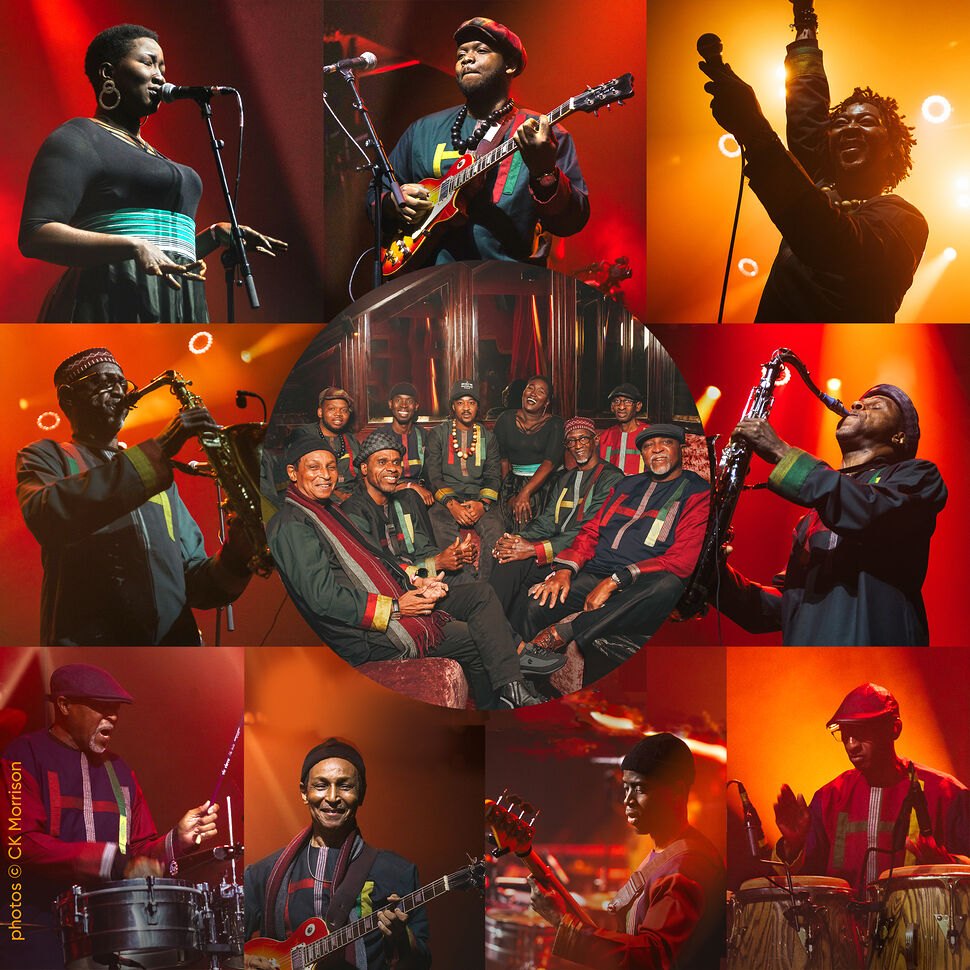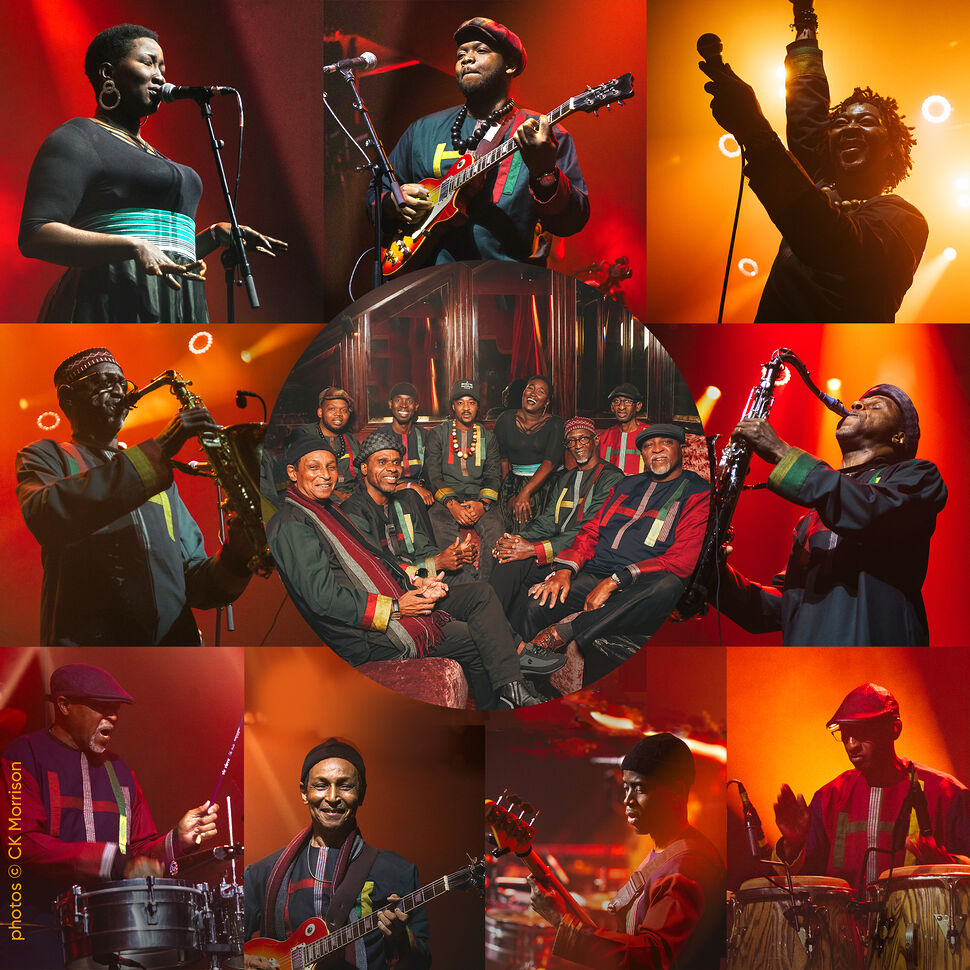
This year marks the 50th anniversary of one of Africa’s greatest bands, Senegal’s Orchestra Baobab. Their epic story begins in the heart of Dakar’s Medina in the late 1960s, and extends across the world and into the 21st century, featuring an extraordinary group of singers and players from across the continent, and encompassing a ground-breaking mix of Afro-Latin styles, international pop, traditional griot music, and an after-dark nightclub ambience of lilting, mellifluous rhythms.
The band owes their start to the entrepreneurial force that was Ibra Kassé, club owner, impresario and founder of the Star Band, whose residency at Dakar’s Club Miami in the mid 60s made it a notoriously lively joint. Here, Kassé’s house band lit up the night with a music flavoured by new rhythms from around the world, all flowing into Dakar – a modern and cosmopolitan city and one of the great ports of west Africa – from America, Europe, and Cuba, as well as from Senegal’s West African neighbours Ghana, Sierra Leone, Nigeria, Guinea and the Ivory Coast. During this period of cultural convergence, Senegalese traditional music was also being heavily championed and promoted by Léopold Senghor, Senegal’s renowned president, poet and cultural theorist. This eclectic blend of local and international rhythms and styles would all later feed into Baobab’s DNA.
By the start of 1970, at the height of the Star Band’s fame, a new fashionable venue, Club Baobab, opened its doors in Dakar’s European district. Well known as a hangout for those with status and power, the club was built around a baobab tree, and to fire up its musical roster, its well-connected owners poached Star Band singers Balla Sidibe, Rudy Gomis and guitarist Barthelemy Attisso. Bassist Charlie Ndiaye and percussionist Mountaga Koite soon followed, joined by rhythm guitarist Latfi Ben Jelloun, Nigerian clarinet player Peter Udo, and veteran griot singer Laye Mboup.
With that, the stage was set for Orchestra Baobab to set the tempo for a new era of modern Senegalese and African music, drawing through the club’s doors a diverse urban crowd ranging from influential politicians and businessmen to army officers, celebrities and expats. “The guy who ran it knew politicians and there was big money,” recalls Barthelemy Attisso. “You had to wear a tie and suit. It was very strict.”
Combining pop, soul, funk and traditional music from across Senegal and beyond, Orchestra Baobab quickly developed a distinctive take on a raft of styles that reflected the cultural mix and the strong musical personalities of its members. Balla and Rudy hailed from Senegal’s culturally rich Casamance area, saxophonist Issa Cissokho from Mali, and Latfi from Morocco. Guitarist Attisso – the lawyer-turned-guitarist whose arpeggio runs would become one of the band’s scintillating trademarks – came from Togo. But what bound these myriad elements as tight as a drum skin was a strong Cuban influence, introduced to Senegal by sailors flowing in and out of the Port of Dakar. This strong Afro-Cuban vibe was tempered with the band’s interest in West African traditional music. “Tradition didn’t enter too much into the Star Band, which was vivid and modern” remembers Attisso. “Experimenting with the traditional, as Baobab did, was unique at that time. There was a huge public appetite for traditional music,” he adds, “so we had that whole scene waiting for us. It gave us a lot of confidence.”
Baobab would remain in residence at the club for seven years, releasing two self-titled LPs featuring the celebrated griot Laye Mboup amongst its vocalists. They took West African music into a vivid future by fusing it with the music of its past, subverting the dominance of Cuban music in Senegal’s clubs and fusing amplified instrumentation with Griot song traditions. Having already become a popular griot in his own right, Laye Mboup often sang in local ceremonies as well as at Club Baobab, and the band needed a stand-in from time to time. Enter two young talented griots, Ndiouga Dieng and Thione Seck, who would join Balla Sidibe, Medoune Diallo and Rudy Gomis as vocalists. Tragically, Laye Mboup died in a car crash in 1974, yet musically, Baobab had hit the motherlode, releasing no fewer than five LPs in 1975 which had been laid down in one remarkable, epic recording session.
Holding down their club residency as well as touring Cameroon, Tunisia and Guinea, in 1977 Orchestra Baobab moved on to the Jandeer Night Club, and Club Baobab closed its doors a few months later. At the Jandeer they recorded two classic LPs, Une Nuit au Jandeer ###/iNdeleng Ndeleng, getting paid not in cash but in brand new, top-of-the-line musical equipment – a deal that helped secure their freedom to tour more widely. Both albums anticipated the powerful energy of a new sound, mbalax, the sabar drum-powered dance music that would come to reflect a new urban Senegal at the dawn of the 1980s.
Come the summer of 1978, and Baobab’s members packed their bags for a French tour and to record new material. The trip was a challenging one – poorly managed, penniless, a long way from home and with unfamiliar equipment, the band’s time in Europe was characterised by tension and disillusionment. They did, however, somehow manage to record two exceptional albums, Volumes 1 & 2, which further showcased the band’s maturing sound. Volume 1 included ‘On Verre Ca’ (translation: we’ll see about that!) which became an enormous hit across West Africa, with vocalist Balla Sidibé name-checking the whole band and their wives throughout the song.
On return to Dakar the band took up a fresh residency at a new restaurant, Ngalam, where their music took on a more subtle, mellower sound. Here they set to work on classic albums Gouygui Dou Daanou and Si Bou Odja, that refined and defined the band’s new style, and gave us the likes of the incomparable ‘Bamba’.
A classic Afro-Cuban feel, as warm and close as a subtropical night, lingers on in 1982’s seminal Ken Dou Werente, with the band letting loose on classics such as ‘Utrus Horas’, which, with its bolero vibe, has since become a much-loved classic of African pop music, and ‘Coumba’, a lilting love song written by Gomis to his wife. A hymn to respect and tolerance, ‘Werente Werigne’ might just be Baobab’s true masterpiece and one of the most beautiful African songs ever recorded. This iconic album steadily assumed ‘desert island’ status thanks to its reissue in 1989 as Pirate’s Choice by World Circuit, marking Baobab’s first sure steps towards international recognition and adulation.
However, a long hiatus was in store first. By the end of 1983, Baobab was no longer the tight, toned night club band of yore, more a loosely-bound group of musicians who got together now and then. Attisso, for example, had left to become a lawyer in his native Togo, while Rudy Gomis, by then a highly qualified teacher trainer, had started a prestigious language school. The sound and feel of the music around them had been changing, too. Hard-hitting mbalax pounded from the PAs of Youssou N’Dour’s Etoile de Dakar and Thione Seck’s Raam Daam bands, adopting and adapting a rhythm born of Baobab, but stealing the show and Baobab’s audiences with it. By 1987, Baobab had unofficially disbanded, and it wasn’t until Nick Gold and Youssou N’Dour encouraged the original group to reform 15 long years later that Orchestra Baobab rose again, coming together for an unforgettable London Barbican gig in 2001 and received a standing ovation that seemed to go on forever.
As the new century advanced, Baobab’s distinctive heartbeat could be heard once again on 2002’s seductive Specialist In All Styles, with the band revisiting classics such as the mighty ‘On Verra Ça’. Even more fully realized, 2007’s Made In Dakar was cut in two weeks in Youssou N’Dour’s studio, and had the feel of a real homecoming. Indeed, after touring the world, the band settled into another of their legendary residencies at Dakar taverna restaurant Just4U, and let the music flow through the night in a series of intimate gigs in the restaurant’s garden.
Ten years on, and Baobab’s lineup has continued to evolve, with some sad departures and some exciting new additions over the past decade. Guitar player Barthemely Attisso moved back to Lomé to continue his career in law, and Ndiouga Dieng and Issa Cissokho sadly passed away in November 2016 and March 2019 respectively. Now, alongside Baobab stalwarts including founding members Balla Sidibé, bassist Charlie Ndiaye and percussionist Mountaga Koité, there’s new rhythm guitarist Yahya Fall (a veteran of the Dakar music scene) and Beninese lead guitarist Rene Sowatche (the most prominent of the many young West African musicians flocking to Dakar for its burgeoning live scene). The horn section now features Benin-born Wilfred Zinzou – a player new to Baobab, but not to Dakar – Senegal’s sole trombonist has long played with Cheikh Lô, and has been a music scene fixture for many years. Amongst the vocalists is Ndiouga Dieng’s son Alpha, who continues the griot tradition in spectacular form.
Under the great Balla Sidibé’s leadership, their critically acclaimed 2017 LP Tribute to Ndiouga Dieng revisited old territories and broke new ground for these beloved West African veterans, and since its release, they have continued to tour worldwide, bringing their rich and much-loved sound to new and longtime fans alike.
Celebrating 50 years as one of Africa’s greatest bands – one whose popularity has taken them around the world – is an achievement few can equal, and while special Anniversary shows have been put on hold as a result of the global Coronavirus outbreak, plans remain in place to celebrate the band and their story through filmed performances and interviews, remixes and playlists, to help the prestigious Orchestra’s global legion of fans celebrate their half-century milestone.







